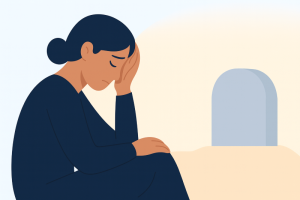🌱 At a glance: the first 72 hours
Understanding what to do when someone dies can be overwhelming, especially in your first moments of grief. In the UK, there are only a few urgent steps you need to take. Everything else can wait until you feel ready.
First things to do:
- Confirm the death
- Get the Medical Certificate of Cause of Death
- Register the death (within 5–8 days depending on location)
- Secure the home and important belongings
- Begin gentle funeral planning
- Tell the right people (family, employer, and government via Tell Us Once)
1. How do I confirm the death?
- If expected at home: call the GP or out-of-hours doctor.
- If in hospital or a care home: staff will handle this for you.
- If sudden or unexpected: call 999. Police and the coroner may be involved.
💡 You are not expected to know all the answers. Professionals will guide you.
2. What is the Medical Certificate of Cause of Death?
A doctor (or the coroner if required) issues the Medical Certificate of Cause of Death. You must have this certificate before you can register the death.
3. How quickly must I register a death in the UK?
- England, Wales, Northern Ireland: within 5 days
- Scotland: within 8 days
- The clock starts once you have the Medical Certificate.
You’ll receive an official death certificate, which you’ll need for banks, property, and probate. Most families order 5–10 certified copies (about £11 each).
💡 Registrars are supportive. Appointments usually take 30–60 minutes. You can bring someone with you.
4. How do I secure the home and belongings?
If your loved one lived alone, it helps to:
- Ensure the home, pets, and valuables are safe.
- Redirect post if needed.
- Gather important documents (ID, will, bank statements, property deeds).
5. What should I do about the funeral?
Look for any written wishes in:
Having knowledge of what to do when someone dies UK can save you from unnecessary stress during a difficult time.
- A will
- A prepaid funeral plan
- Letters or notes
If no wishes are found, the immediate family usually decides together. A funeral director can help manage arrangements, but using one is optional.
6. Who should I tell after a death?
- Tell Us Once service (England, Wales, Scotland) allows you to notify most government departments in one go.
- In Northern Ireland, you must contact each department separately.
- Also let close family, friends, and (if relevant) the person’s employer know.
💡 Gentle reminder
The only urgent steps are confirming the death, getting the medical certificate, and registering the death. Everything else — funeral planning, probate, paperwork — can wait until you’re ready.
One step at a time is enough.
